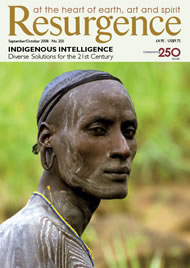THE GLOBAL DIVERSITY Fund – in collaboration with diverse partner institutions – is launching its Biocultural Diversity Learning Network (BDLN) at the World Conservation Congress held in Barcelona, Spain from 5-14 October 2008. Through training courses, ‘Knowledge Café’ roundtables and an ‘Aliances’ workshop, GDF will publicise its ‘Assling Accord’, which sets out a common goal of fulfilling the desire of our local and indigenous colleagues around the world to acquire and develop tools of research and teaching. It noted that the guardians of biocultural diversity and their allies have a distinct preference for:
• Pursuing community-based ethnoecology (making biological collections, mapping resources, recording knowledge) in contrast to hosting scientific expeditions from abroad;
• Learning about community and participatory photography and video instead of having professional documentary makers and photographers represent theirs regions in words and images;
• Acquiring the hardware, software and skills to create their own multimedia databases and geographical information systems rather than having highly technical – and perhaps difficult to maintain – informatics products from abroad;
• Developing in-country expertise for identifying species and authenticating herbal remedies, including through advanced techniques such as genetic bar-coding, in place of sending biological collections and samples abroad;
• Engaging in training on place-based writing to complement written works by international authors and in place-based research to address their own intellectual and practical priorities;
• Establishing viable living museums in their own communities rather than having their cultural artifacts and portrayals of their lifestyles housed in overseas institutions.
The spirit is not exclusionary – the hospitality and intellectual curiosity that we witness in many communities and regions preclude this – but there is cautiousness about external projects and researchers. This is feeding a growing awareness that any work on the cultural knowledge and genetic resources of local communities and indigenous peoples should follow best practice. Collaboration starts with a focus on building local infrastructure and skills and implies application of the letter and spirit of international conventions, national laws and local customs.
Through the BDLN, we will continue discussions with diverse colleagues about the basic steps needed to ensure that appropriate research and education continue while intellectual property and genetic resources are protected. It is in this spirit that we are bringing together a group of innovative colleagues from multidisciplinary backgrounds to launch new courses, convene meetings to review progress and contribute to an Online Learning Guide on Biocultural Diversity. During this process, we will establish an alumni network of all trainers and participants who have taken part in courses and workshops over a ten-year period. Periodic updates will be delivered through the free BDLN eNewsletter. •
For more information please visit www.globaldiversityfund.net or contact Erin Smith [email protected] to subscribe.







